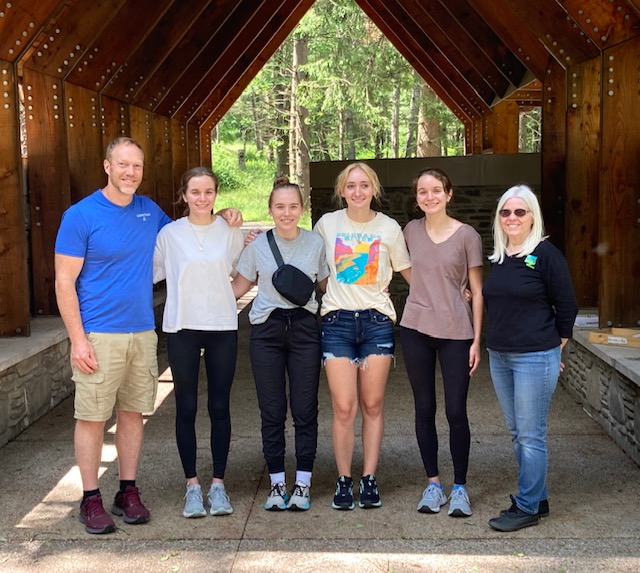
Allegheny College Students and Alumna Collaborate on Autism Nature Trail for Pymatuning State Park
Recreational activity should be accessible to all, but it can be challenging for those with autism or developmental disabilities due to sensory overload, restricted behavior, and unpredictable surroundings. In response, a group of Allegheny College students sought opportunities to improve recreational access by developing a feasibility plan for an autism nature trail at Pymatuning State Park in Crawford County.
Emma Anderson ’23, a psychology major with a writing minor, and Ela Williams ’23, an English and psychology major, were initially intrigued by the autism nature trail (The ANT) at Letchworth State Park in New York. They learned about the first-of-its-kind trail when conducting research with the interdisciplinary Cognitive Humanities Lab on campus.
Two more students were later invited to join the project: Kelsey Anderson ’23, an English major and economics minor, and Haley Pageotte ’24, an environmental science and sustainability major and economics minor. The summer research project was supervised by Monali Chowdhury, associate professor of psychology, whose research interests include autism spectrum disorders (ASDs).
The ANT is a one-mile loop trail featuring stations that build sensory processing and perception skills. Little did the students know that the co-founder of The ANT was an Allegheny alumna.
“When the students sent an email to The ANT website for information, they had no idea an Allegheny alum would answer,” says Loren Lamy Penman ’74, who majored in English. “The students were highly engaged, and I was thrilled by their insight, intelligence, and genuine interest in making inclusion in outdoor recreation a reality in western Pennsylvania.”
Penman invited the students to experience The ANT firsthand with a personalized tour, explaining the trail’s conception, financial support, and construction.
“During our tour at Letchworth State Park, Loren Penman gave us anecdotes about how impactful the trail has been and how it has inspired so much generosity from community members,” Ela Williams says. “This discussion was extremely eye-opening as it put the importance of our project into perspective.”
Chowdhury says trails like The ANT are a step forward in promoting inclusion because the trail provides opportunities tailored for those with autism or developmental disabilities to participate in their community.
“What is also unique about this endeavor is that the trail is specifically designed keeping in mind the needs of these individuals as opposed to retroactively adding features to existing community spaces to facilitate access for people with ASD,” says Chowdhury.
The group began their research by interviewing people at the Barber National Institute in Erie and the Learning Center in Meadville. They also read scholarly articles, books, and performed Geographic Information System mapping to determine potential areas for the trail.
“It was such an incredible experience to discuss the project with local residents, professors, park rangers, teachers, organization leaders, and anybody interested in interacting with our work,” Kelsey Anderson says. “So many people were curious, had familial or professional connections to autism, or wanted to be a part of positive change; it was amazing to witness.”
The proposed trail will include recurring patterns for visitors to recognize for greater predictability and alone zones to soothe individuals who may feel overwhelmed. Different stations will also be incorporated so visitors can try new sensory experiences, such as surfaces like sand or gravel.
The project was facilitated through the summer community-based research program directed by Michael Williams ’98, director of community engaged learning at Allegheny, in partnership with Pymatuning State Park, the Pymatuning Lake Association, and The ANT.
The program, funded by a grant from a source that wishes to remain anonymous, supported the students financially throughout the summer and allowed them to present their findings at West Virginia University’s Summer Undergraduate Research Symposium, Pymatuning State Park’s Onion Festival, and the Allegheny College Research Seminar Series. These opportunities helped refine the students’ final pitch to the Pymatuning Lake Association and Pymatuning State Park, who both expressed interest.
Sean Benson, assistant park manager at Pymatuning State Park, notes that the trail is currently proposed near Tuttle Campground and is pending approval from Harrisburg.
“The trail would primarily be designed for a group of individuals who do not have many opportunities for outdoor recreation in this area,” Benson says. “Getting people with disabilities out into nature is good for mental and physical health. If Pymatuning State Park can provide even a small part of that, then that is a great thing.”